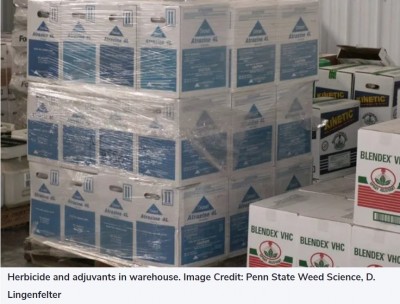Herbicide Supplies and Storage during the Winter

By Dwight Lingenfelter: Penn State Extension
Again, this year, there is a lot of speculation about potential herbicide shortages and price increases on some products for the 2023 growing season. Overall, it does not seem as grim as last year, but indications are that supplies of glyphosate (Roundup, others) and metribuzin should be adequate but likely not back to levels and costs prior to the pandemic. Products such as glufosinate (Liberty, others), metolachlor (plus other group 15 herbicides), atrazine, dicamba, and 2,4-D might be in shorter supply and with higher prices. Also, some products that are packaged in smaller sizes (e.g., 2.5-gallon jugs) might be limited but other sizes such as totes should be more readily available. Furthermore, with volatile supply chain issues involving many aspects of production ag these days, some are asking if it is wise to purchase bulk inventory of herbicides and/or other pesticides. The short answer is yes, if it makes sense economically, it could be a good idea to start making purchases on some of these inputs. Begin now by working with your dealer to discuss these issues. The intent is not to stockpile products but to have a modest supply for use during the next growing season. However, you must keep in mind appropriate storage parameters, namely issues regarding freezing of pesticide products during the winter months. In general, freezing temperatures can change and negatively affect the chemistry of some pesticides inside the container and can also damage the container itself. Premixed liquid products that contain multiple active ingredients seem to be affected more so by low temperatures than single active ingredient products. Some premixes tend to separate in the container and can be difficult to get back into a homogeneous liquid prior to use in the spring. Make sure to read the label for storage instructions. But as a general rule, pesticides are best stored between 40-90°F. For more details and many useful links, please refer to the National Pesticide Information Center's Storage of Pesticides webpage. Another good resource is Penn State's Effect of Cold Temperatures on Pesticides article.
Upcoming Events
WNY Pastureland Conversion & Soil Health Field Day
July 16, 2025
Middleport, NY
Join American Farmland Trust for the Western New York Soil Health Field Day on July 16, 2025, at Zeliff Farm in Middleport, NY, from 9:00 AM-3:15 PM. Learn about pasture conversion, soil health benchmarking, biochar in grazing systems, and best grazing practices. Plus, enjoy hands-on demos with the NY Soil Health Trailer, drones, and cover crops! Check out the attached agenda for more information about the field day and REGISTER HERE. Zeliff Farms is a regenerative beef operation who has recently partnered with AFT on outreach and education to farmers including learning circles and evaluating biochar effects on soil health.
IPM Strategies to Protect Corn and Soybean Seed in NY
July 30, 2025
Hamburg , NY
SWNYDLFC and Cornell IPM are hosting a grower meeting to discuss integrated pest management strategies for protecting corn and soybean seed in New York.
FAMACHA Training for Sheep and Goat producers in Woodhull NY
August 13, 2025 : FAMACHA Training in Woodhull
Woodhull, NY
Join us for a discussion and hands-on training for internal parasite integrated pest management in sheep and goats. Certification is available to all students participating in the workshop.
Announcements
No announcements at this time.





